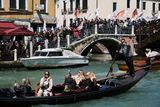Books: A trip of renewal in homeland
Up Against The Night, Justin Cartwright, Bloomsbury, €20.55
Up Against the Night negotiates the hazardous terrain of family, place and history, sometimes hinting at a paradise or ideal, which, if it ever existed, has been long since lost.
Frank McAllister grew up white in South Africa but now lives a very prosperous life in London, from whence he returns to his home country for a visit with his new love Nellie, her son Bertil, and his daughter Lucinda.
Frank's road from unhappy marriage to Georgina to bliss with Nellie is paved with bad memories, pessimism and doubt, just as South Africa's journey from apartheid to a free and equal society is marred by a political and social system unable to deal with rising poverty and increasingly violent crime.
In this, his 13th novel, Justin Cartwright takes us on parallel journeys as Frank and his troupe come face to face with the reality of day-to-day living that is not always ideal in the new South Africa.
However, in keeping with many ex-pat South Africans, Cartwright and Frank never lose the sense of wonder and pride at the stunning beauty of their home country.
One of Cartwright's great strengths is his ability to describe that natural splendour to the reader with a power and eloquence that is near philosophical.
We are taken, tour-guide fashion, over the lush, fertile planes, across the majestic Table Mountain and down to where the wild Atlantic, with its abundant life, washes the coastline, while whales and seals frolic and play.
Below the surface, and out of sight, are sharks that tear young surfers apart and rocks that trap them in the rising tide. But it is still paradise; just be careful.
Cartwright moves between such rich description and writing that is so banal, pedantic and spare it reads as little more than notes. It is as though he suddenly finds himself out of time but with something that must be mentioned. The effect is, at first, jarring.
Both the author and Frank are descendants of Piet Retief, the Boer leader massacred by the Zulu leader, Dingane, in 1838. Frank embarks on a personal quest within a quest when he sets off to visit the site of the massacre and the burial place of his ancestor.
Far from allowing this event to be an apologia for apartheid, Cartwright concludes the Boer leader's real intentions were not those of a weary farmer in search of land to farm to keep his people, but to take control of that lush landscape from the Zulu.
Cartwright also recognises that the massacre provided the justification for much of the white brutality visited on black South Africa.
However, the unstable and violent cousin, Jaco, shows Retief's legacy is not universally rejected, and prosperity is not the lot of all white South Africans - even with the same family.
Join the Irish Independent WhatsApp channel
Stay up to date with all the latest news














